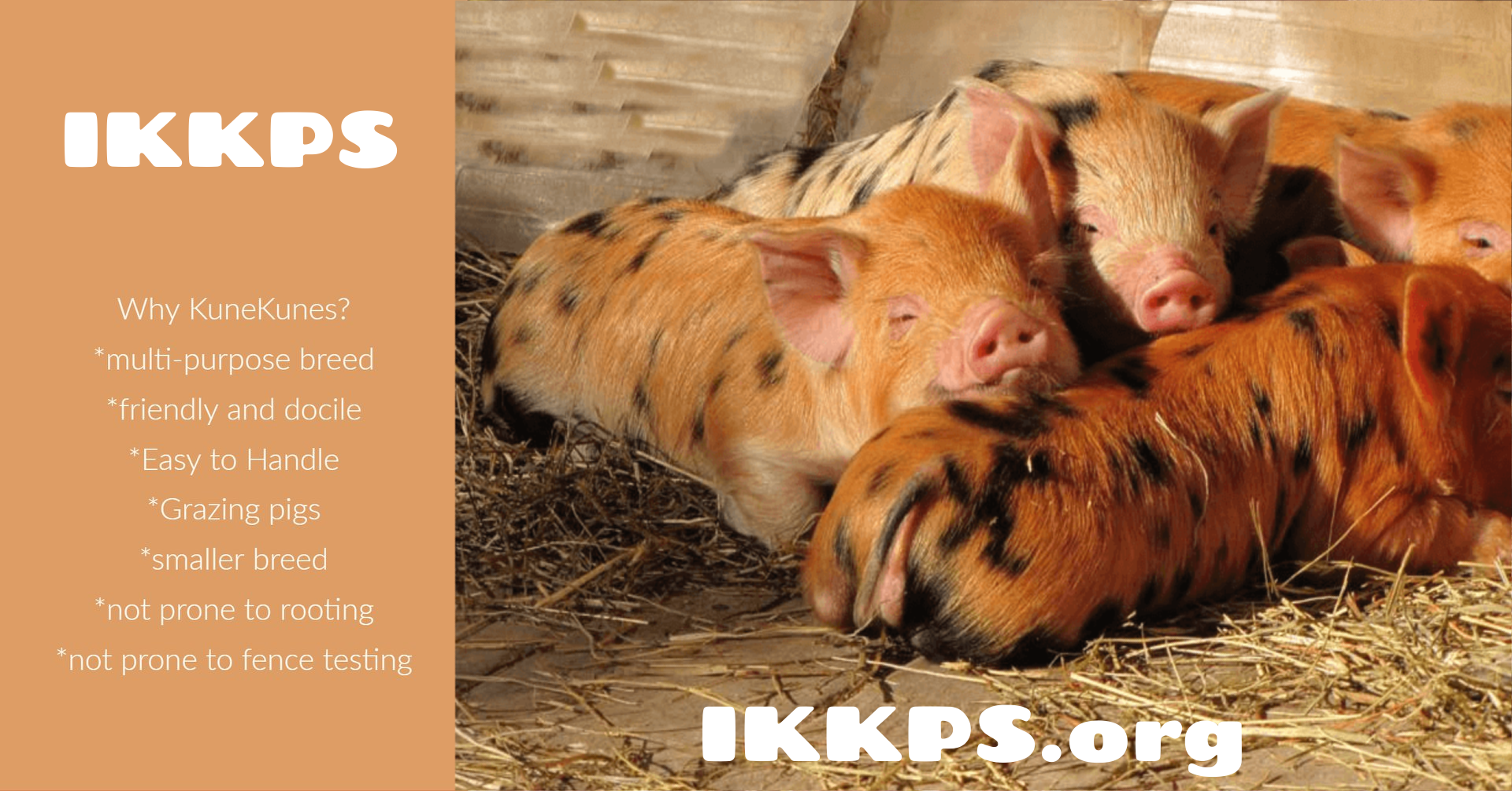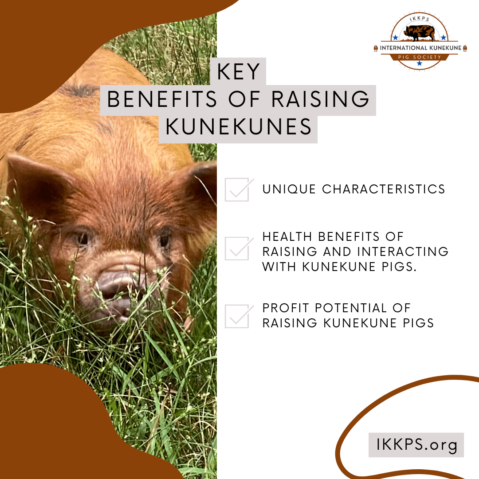
Sign Up
Want to receive a newsletter to learn more about KuneKune pigs and other educational information? Sign up to have them delivered right to your inbox.
We look forwarded to sending you some great info.
The Remarkable Benefits of Raising KuneKune Pigs
Discover the many benefits of raising KuneKunes in this educational article. Are you an animal lover looking for a rewarding new venture? If so, raising KuneKune pigs may be the perfect opportunity for you. These charming and docile creatures are gaining popularity among small-scale farmers and homesteaders for their remarkable advantages. It is an amazing experience for the whole family. This breed is just awesome for animal lovers, meat producers, families, and even as therapy animals. Now let's dive into all the many benefits of raising KuneKune pigs.
What sets these pigs apart are their incredible adaptability and minimal maintenance needs. KuneKune pigs are excellent grazers, thriving on a varied diet that includes grass, forage, and fruits. They require less feed than their counterparts and are less prone to health issues, reducing your veterinary expenses.
Moreover, raising KuneKune pigs can be a profitable venture. With increasing demand for ethically raised, high-quality pork, you have the potential to tap into a niche market and secure a loyal customer base. So, if you are ready for a unique and fulfilling endeavor, consider raising KuneKune pigs - an unmissable opportunity for animal lovers like you.
Unique Characteristics of the KuneKune Breed
KuneKune pigs possess a range of unique characteristics that make them stand out among other pig breeds. These charming creatures have a pleasant and friendly temperament, making them a joy to be around. They are known for their docile nature, making them ideal companions for both adults and children.
In addition to their friendly demeanor, KuneKune pigs have a distinctive appearance that sets them apart. They have a short, upturned snout, which gives them an adorable and endearing look. Their wattles, which are fleshy appendages on their cheeks, add to their unique charm. These physical traits make KuneKune pigs a delightful sight to behold.
Furthermore, KuneKune pigs are smaller in size compared to other pig breeds. This makes them particularly well-suited for small-scale farming or homesteading, where space and resources may be limited. Their smaller size also makes them easier to handle and care for, making them an excellent choice for those new to pig farming.
Overall, the unique characteristics of KuneKune pigs make them an attractive choice for animal lovers seeking a special and rewarding venture.

They are commonly used for breeding stock, as they have excellent genetic traits that are highly desirable. Additionally, they are often used for therapy work, as they have a calm and gentle temperament that is perfect for working with people. They can also be used for meat production, as they a rich, red, marbled meat that is sought after by top chefs. Finally, they are great grazing machines, as they can efficiently graze on a variety of vegetation and maintain the health of pastures. Overall, this breed is an excellent choice for farmers and ranchers looking for a versatile and reliable animal.
Advantages of Raising KuneKune Pigs for Animal Lovers
Raising KuneKune pigs offers a multitude of advantages for animal lovers. These gentle creatures have a natural affinity for human interaction, making them a delight to be around. Their friendly and sociable nature allows for meaningful bonds to form between the pigs and their caretakers.
Furthermore, KuneKune pigs are known for their intelligence and trainability. With patience and positive reinforcement, they can be taught various tricks and behaviors. This not only provides entertainment and mental stimulation for the pigs but also offers a unique and enjoyable experience for animal lovers.
Moreover, raising KuneKune pigs can be a wonderful educational opportunity for children. These pigs are gentle and safe to be around, making them suitable companions for kids. By involving children in the care and raising of KuneKune pigs, they can learn important lessons in responsibility, empathy, and the value of demanding work.
Additionally, the adaptability of KuneKune pigs makes them suitable for various living environments. Whether you have a small backyard or a larger piece of land, these pigs can thrive. Their minimal maintenance needs and ability to graze on a variety of foods make them a convenient choice for animal lovers with busy schedules or limited resources.
KuneKune Pigs as Therapy Animals
KuneKune pigs have shown enormous potential as therapy animals, providing emotional support and assistance to individuals in need. Their friendly and calm nature makes them well-suited for therapeutic interventions and animal-assisted activities. Therapy animals, including KuneKune pigs, have been found to have a positive impact on individuals with various physical, mental, and emotional conditions. Interacting with these animals can help reduce anxiety, lower blood pressure, and improve overall well-being.
In particular, KuneKune pigs have been used in therapy settings to aid individuals with autism spectrum disorders. The presence of these animals can help promote social interaction, communication, and emotional regulation. Their non-judgmental and accepting nature creates a safe and comfortable environment for individuals to express themselves.
There is a well-known farm in Missouri that is focusing on bringing joy and therapy KuneKunes to nursing homes. They have started a non-profit organization that is all about using KuneKunes as a therapy animal.
Furthermore, the tactile experience of interacting with KuneKune pigs can provide sensory stimulation and promote relaxation. The act of petting or grooming these animals can have a calming effect on individuals, reducing stress levels and promoting a sense of peace. In conclusion, KuneKune pigs have the potential to serve as
valuable therapy animals, offering emotional support and therapeutic benefits to individuals in need.
To learn more about Therapy Programs for KuneKunes visit the link below.
Health Benefits of Raising and Interacting with KuneKune Pigs
Raising and interacting with KuneKune pigs can have numerous health benefits for both the animals and their caretakers. These benefits extend beyond the physical and encompass mental and emotional well-being as well. First and foremost, spending time with animals has been shown to reduce stress levels and promote relaxation. The calming presence of KuneKune pigs can have a therapeutic effect on individuals, allowing them to unwind and find solace in their company. This can be particularly beneficial for those living in hectic urban environments or dealing with elevated levels of stress. For me, being out with my KuneKune herd was relaxing after a long day at work.
Furthermore, caring for and raising KuneKune pigs requires physical activity and engagement. This can help individuals maintain an active lifestyle and promote overall fitness. Activities such as feeding, grooming, and exercising the pigs provide a form of exercise that is both enjoyable and beneficial for physical health.

In addition to the physical benefits, interacting with KuneKune pigs can also improve mental health. The bond formed between humans and animals can provide a sense of companionship and emotional support. This can be especially valuable for individuals experiencing feelings of loneliness or isolation.
Moreover, the act of caring for animals can instill a sense of purpose and fulfillment. The responsibility of raising KuneKune pigs and ensuring their well-being can give individuals a sense of accomplishment and meaning in their lives. This can contribute to a positive mindset and overall satisfaction. In conclusion, raising and interacting with KuneKune pigs can provide a range of health benefits, including stress reduction, physical activity, companionship, and a sense of purpose.
Profit Potential of Raising KuneKune Pigs
Raising KuneKune pigs can be a profitable venture for those looking to enter the agricultural industry. With the increasing demand for ethically raised, high-quality pork, there is a growing market for KuneKune pig products. One advantage of raising KuneKune pigs is their ability to thrive on a varied diet that includes grass, forage, and fruits. This reduces the cost of feed, making them a cost-effective choice for farmers.
Additionally, their smaller size means they require less space and resources compared to other pig breeds, reducing overhead costs. Moreover, the unique characteristics and appearance of KuneKune pigs make them highly sought after by consumers. The charming and docile nature of these pigs, combined with their distinctive physical traits, makes them a popular choice for those seeking ethically raised and high-quality pork. This demand creates an opportunity for farmers to tap into a niche market and establish a loyal customer base.
Furthermore, the versatility of KuneKune pigs allows for the production of various products beyond pork. The pig's lard can be bred for cooking, and making soaps and candles. Additionally, their friendly nature and trainability make them suitable for petting zoos or educational programs, providing additional income streams.
Getting Started with Raising KuneKune Pigs
Getting started with raising KuneKune pigs requires careful planning and preparation. Here are some key steps to help you begin your journey:
1. Research and Learn: Familiarize yourself with KuneKune pig breed characteristics, care requirements, and best practices. Understand their unique needs and determine if they align with your resources and goals.
2. Secure Suitable Land: Ensure you have adequate land for the pigs to graze and roam. KuneKune pigs require space to exercise and access to fresh pasture. Consider fencing requirements and any local regulations.
3. Find Reputable Breeders: Locate reputable KuneKune pig breeders who prioritize animal welfare and breed quality. Visit the breeder's farm, ask questions, and inspect the living conditions of the pigs before making a purchase.
4. Set Up Proper Housing: Provide a comfortable and secure shelter for your KuneKune pigs. The housing should protect them from extreme weather conditions and predators. Ensure proper ventilation and adequate space for each pig.
5. Plan for a Balanced Diet: Consult with a veterinarian or experienced pig farmer to develop a nutritional plan for your KuneKune pigs. Their diet should consist of a variety of grass, forage, fruits, and a balanced commercial pig feed.
6. Establish a Healthcare Routine: Schedule regular vaccinations for your pigs. Implement a parasite control program and maintain good hygiene practices to prevent illness and promote their well-being.
7. Provide Enrichment and Socialization: KuneKune pigs thrive on social interaction and mental stimulation. Offer toys, mud puddles, companionship, and opportunities for exercise to keep them engaged and happy. Spend time bonding with your pigs to develop a strong and trusting relationship.
By following these steps and dedicating time and effort to your KuneKune pigs, you can set yourself up for a successful and fulfilling experience.
Caring for KuneKune Pigs - Diet, Housing, and Healthcare
IKKPS offers you many resources on these topics but, wanted to mention some here as well. Proper care and attention are essential for the health and
well-being of KuneKune pigs. Here are some key aspects to consider when caring for these unique animals:
Diet
KuneKune pigs are excellent grazers and thrive on a varied diet. Their diet should consist of fresh grass, forage, fruits, and a balanced commercial pig feed. It is important to provide access to pasture for grazing, as it contributes to their overall health and happiness. Additionally, ensure they have access to clean drinking water at all times.
Housing
KuneKune pigs require suitable housing that protects them from the weather and predators. The housing should be well-ventilated, spacious, and comfortable. Consider using sturdy materials and secure fencing to prevent escapes and intrusions. Regularly clean the housing to maintain hygiene and prevent the buildup of waste. Livestock huts are a great option. They are easy to move and clean.
Healthcare
Work with a veterinarian experienced in pig care to establish a healthcare routine. This includes vaccinations, parasite control, and preventive measures against common pig diseases. Maintain good hygiene practices, such as cleaning and disinfecting the living areas, to prevent the spread of diseases. You can learn to give vaccinations and deworming to cut down your overall costs involved. As a plus, KuneKune pigs are extremely hardy and disease-resistant.
Find a veterinarian that is familiar with KuneKunes before you need them. Develop a good relationship with them. If possible select a vet that does farm calls as this may be needed in the case of an emergency.
Enrichment and Socialization
KuneKune pigs are highly social animals and require social interaction and mental stimulation. Provide toys, mud puddles, and grazing opportunities for exercise to keep them mentally engaged. Spend time with your pigs, bonding and building trust. This not only enhances their well-being but also strengthens the human-animal bond.
By prioritizing their diet, housing, healthcare, and socialization needs, you can ensure that your KuneKune pigs lead happy and healthy lives.
Common Misconceptions about Raising KuneKune Pigs
Despite the numerous advantages of raising KuneKune pigs, some common misconceptions may deter potential farmers. Let us address these misconceptions and provide clarity:
1. KuneKune pigs are difficult to find: While KuneKune pigs are a rarer breed, their popularity has been increasing. Reputable breeders can be found, and with some research and networking, you can source healthy KuneKune pigs.
2. KuneKune pigs require extensive space: Although KuneKune pigs do appreciate access to pasture, they are smaller in size compared to other pig breeds. This makes them suitable for smaller properties or backyard farming.
3. KuneKune pigs are aggressive: On the contrary, KuneKune pigs are known for their friendly and docile nature. They are generally non-aggressive and make excellent companions.
4. KuneKune pigs are high maintenance: While all animals require care and attention, KuneKune pigs have lower maintenance needs compared to other pig breeds. They are adaptable, require less feed, and are less prone to health issues.
5. KuneKune pigs are not profitable: With the growing demand for ethically raised, high-quality pork, there is a profitable market for KuneKune pig products. By targeting niche markets and emphasizing the unique qualities of KuneKune pigs, farmers can establish a profitable business.
By dispelling these misconceptions, more individuals can recognize the remarkable advantages of raising KuneKune pigs and embrace the opportunities they offer.
Another Great Book about Meat Production
Registry Office
17500 Hamilton Arms Court Dewitt, VA 23840